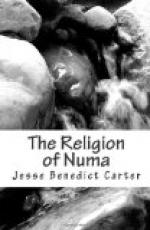But by just as much as the human element was absent from the concept of the deity, by just so much the element of formalism in the cult was greater. This formalism must not be interpreted according to our modern ideas; it was not a formalism which was the result and the successor of a decadent spirituality; it was not a secondary product in an age of the decline of faith; but it was itself the essence of religion in the period of the greatest religious purity. In the careful and conscientious fulfilment of the form consisted the whole duty of man toward his gods. Such a state of affairs would have been intolerable in any nation whose instincts were less purely legal. So identical were the laws concerning the gods and the laws concerning men that though in the earliest period of Roman jurisprudence the ius divinum and the ius humanum are already separated, they are separated merely formally as two separate fields or provinces in which the spirit of the law and often even the letter of its enactment are the same. Such a formalism implies a very firm belief in the existence of the gods. The dealings of a man with the gods are quite as really reciprocal as his dealings with his fellow citizens. But on the other hand though the existence of the gods is never doubted for a moment, the gods themselves are an unknown quantity; hence out of the formal relationship an intimacy never developed, and while it is scarcely just to characterise the early cult as exclusively a religion of fear, certainly real affection is not present until a much later day. The potentiality of the gods always overshadowed their personality. But this was not all loss, for the absence of personality prevented the growth of those gross myths which are usually found among primitive peoples, for the purer more inspiring myths of gods are not the primitive product but result from the process of refining which accompanies a people’s growth in culture. Thus the theory of animism illumines the religious condition of that borderland of history in which Romulus and Numa Pompilius have their dwelling-place.
According to that pleasant fiction of which the ancient world was so extremely fond—the belief that all institutions could be traced back to their establishment by some individual—the religion of Rome was supposed to have been founded by her second king Numa, and it was the custom to refer to all that was most antique in the cult as forming a part of the venerable “religion of Numa.” For us this can be merely a name, and even as a name misleading, for a part of the beliefs with which we are dealing go back for centuries before Romulus and the traditional B.C. 753 as the foundation of Rome. But it is a convenient term if we mean by it merely the old kingdom before foreign influences began to work. The Romans of a later time coined an excellent name not so much for the period as for the kind of religion which existed then, contrasting the original




